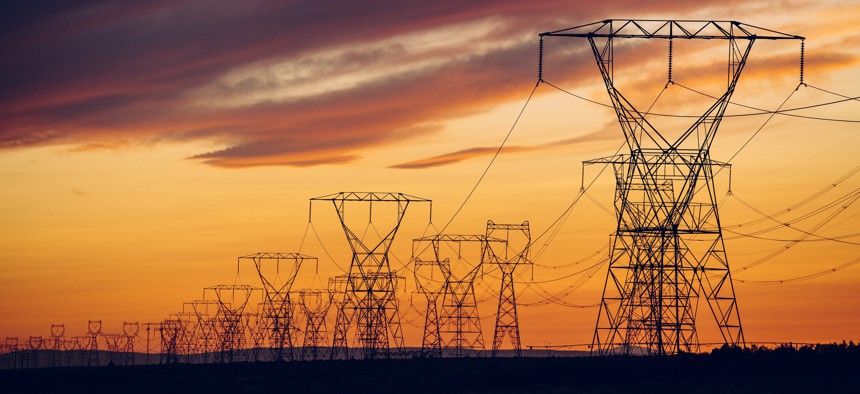Biden Administration Releases Road Map to Scale Up Nuclear, Hydrogen and Energy Storage

Pete Saloutos via Getty Images

Connecting state and local government leaders
The reports address key challenges and potential solutions for getting these clean energy technologies off the ground.
This article was first published by Grist. Read the original story here.
Last week, the Department of Energy, or DOE, released a road map for scaling up three emerging technologies that could make or break the U.S. energy transition. According to the agency, advanced nuclear, clean hydrogen, and long-duration energy storage are crucial for reaching net-zero emissions. The problem is, self-sustaining markets for these technologies don’t exist yet.
The department’s new “Pathways to Commercial Liftoff” reports identify key challenges and potential solutions for getting these industries off the ground. They provide, for the first time, concrete numbers on how much additional energy capacity is needed from each of the three new technologies to reach U.S. climate goals. They also spell out how much money private and government actors will need to invest in research and development, and what challenges stand in the way of commercializing these sectors.
The Biden administration aims to halve emissions by 2030 and hit net-zero emissions by 2050. These fast-approaching deadlines mean that the next few years are critical for redrawing the energy landscape.
“It’s an all-hands-on-deck situation, but it’s also an all-technologies-on-deck situation,” said DOE chief commercialization officer Vanessa Chan in a webinar last week introducing the new reports. “We want to ensure that we’re looking at all technologies that can help toward the president’s ambitious climate goals.”
The “liftoff” reports mark one of the first concrete steps the Biden administration has taken to map out how the government will spend billions in recent clean energy funding. As a result of laws including the 2021 bipartisan infrastructure law, the 2022 Inflation Reduction Act, and the CHIPS and Science Act, which provides energy investments and boosts U.S. semiconductor manufacturing, the DOE now holds tens of billions in climate investments to spend over the next decade.
This huge pot of money means that the agency can help “buy down risk” for companies and private investors that remain hesitant to wade into new energy territory, according to Chan. The new reports highlight the federal government’s plans to help jump-start three new industries.
“Advanced nuclear” is a catch-all term for new nuclear reactor models that improve on the safety and efficiency of traditional reactor designs. Advanced nuclear could help provide stable, reliable electricity to complement renewables like solar and wind, which fluctuate throughout the day. But the nuclear industry is at a “stalemate,” according to the department. Recent nuclear projects have tended to go over budget and run into delays, leaving both project developers and utilities wary about investing in new reactors.
The DOE says the U.S. will need an additional 200 gigawatts of advanced nuclear power to reach its climate goals, enough to power about 160 million homes. Getting there will require $35 billion to $40 billion in private and public investments by 2030, and about $700 billion total by 2050. Crucially, the report says that at least five to 10 new reactors need to be in development across the country by 2025 for the U.S. to hit its goals.
Like nuclear, long-duration energy storage aims to provide a stable source of power. The technology includes batteries and other grid-connected systems that can store energy from renewables and then dispatch it for 10 hours or longer when the wind isn’t blowing and the sun isn’t shining. About 225 to 460 gigawatts of long-duration energy storage could come online by 2050, the DOE report says—but first, capital costs need to go down by half. And reaching market viability will require $330 billion in investments by 2050.
Clean hydrogen, a fuel produced using renewable energy, has the potential to replace traditional fossil fuels in industries that can’t easily run directly on clean electricity. Today, hydrogen is almost exclusively produced from fossil fuels, and is primarily used for oil refining and chemical fertilizers. But if clean hydrogen can get to commercial scale, the DOE estimates that hydrogen alone could reduce U.S. carbon emissions by 10 percent by 2050 by replacing fossil fuels in aviation, shipping, and industries that currently use hydrogen as a feedstock, like ammonia and methanol production.
Sasan Saadat, a senior research and policy analyst at Earthjustice, stressed the importance of first displacing today’s use of fossil fuel-derived hydrogen before turning to novel sectors like road transportation and aviation. “It would be foolish to invest in creating new demand before we finish cleaning up hydrogen’s existing footprint,” he told Grist.
He lauded the “liftoff” reports for highlighting this near-term goal. But as the agency moves forward with public investments, Saadat said officials will need to provide clear guidance on which end uses to prioritize. Otherwise, “We may end up with a situation where we use a bunch of scarce green hydrogen to do things that electricity could have done more easily.”
Some industry experts have also raised concerns about the lack of options for safely transporting and storing hydrogen fuel. The DOE has already earmarked $8 billion toward funding up to 10 regional “hydrogen hubs,” in the hopes of creating a network of infrastructure to address transportation concerns. In all, the public and private sectors would need to commit $85 billion to $215 billion to hydrogen through 2030 to align with U.S. climate goals.
DOE officials emphasized that the reports—developed after dozens of conversations with companies, investors, and technical experts—are not prescriptive. As “living, breathing documents,” the reports will be regularly updated according to the most up-to-date information and ongoing consultation with relevant industries.
“The introduction of any new energy technology at scale is not a linear path,” said David Crane, director of the Energy Department’s Office of Clean Energy Demonstrations. “It’s a winding road with speed bumps all along the way.”

NEXT STORY: How to Make Office-to-Housing Conversions Work


